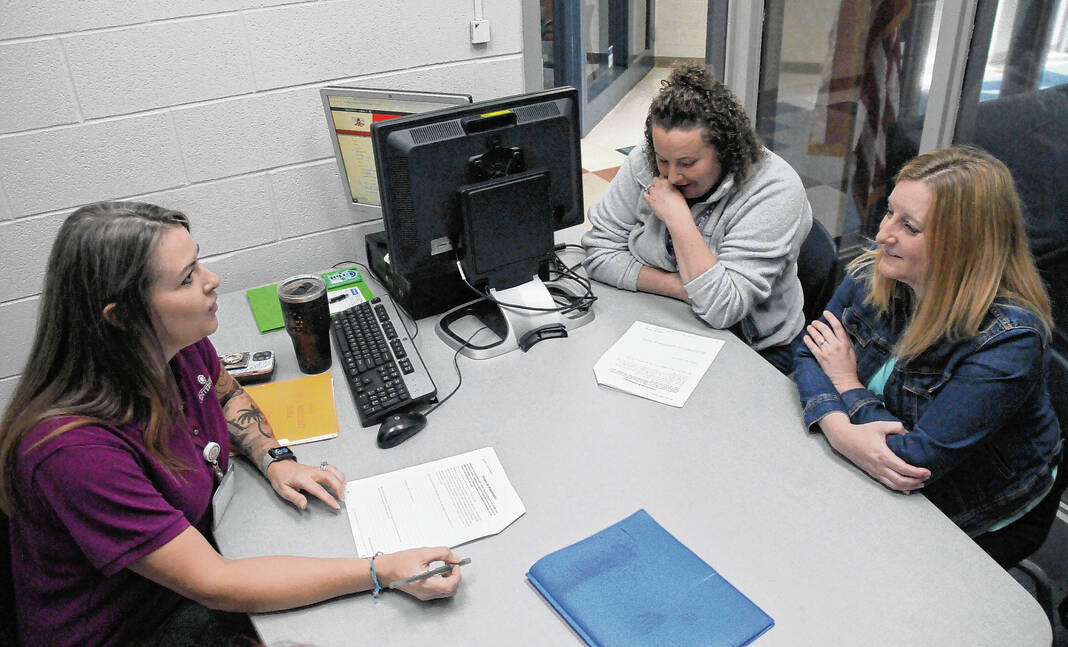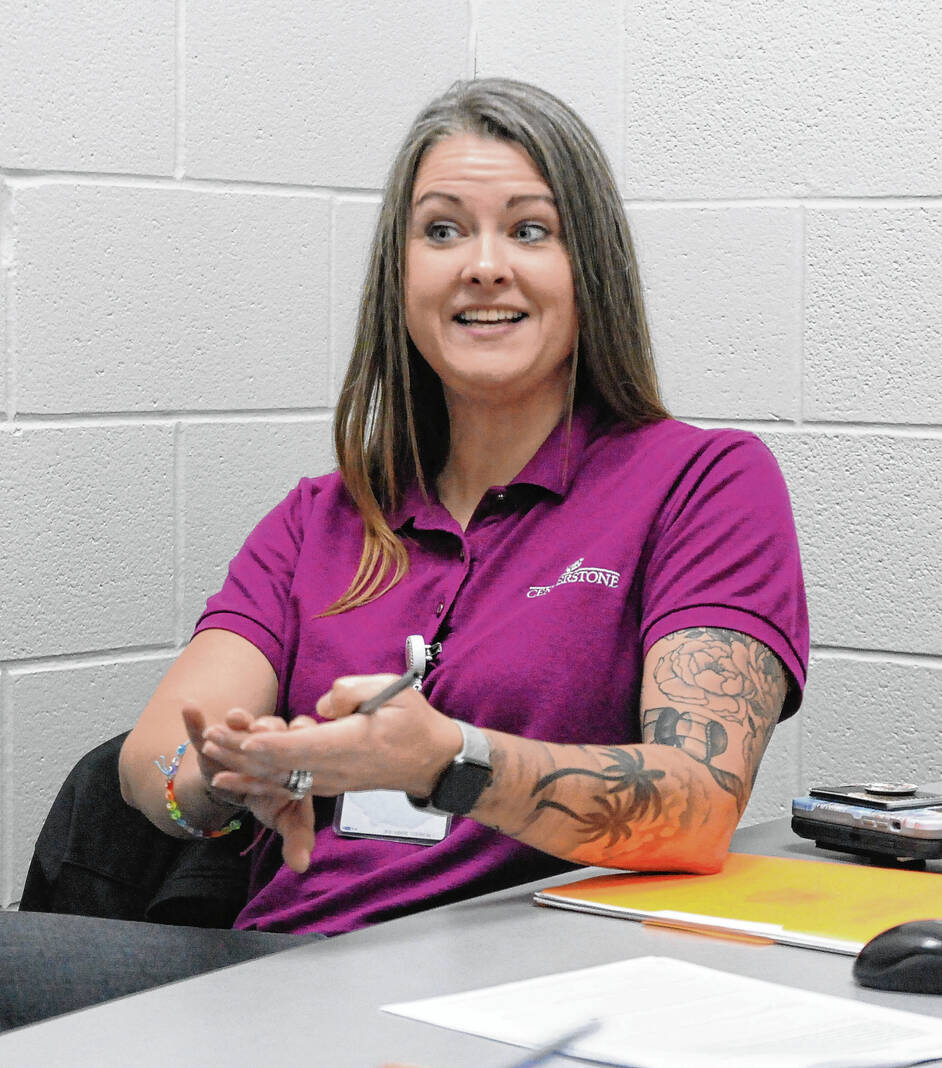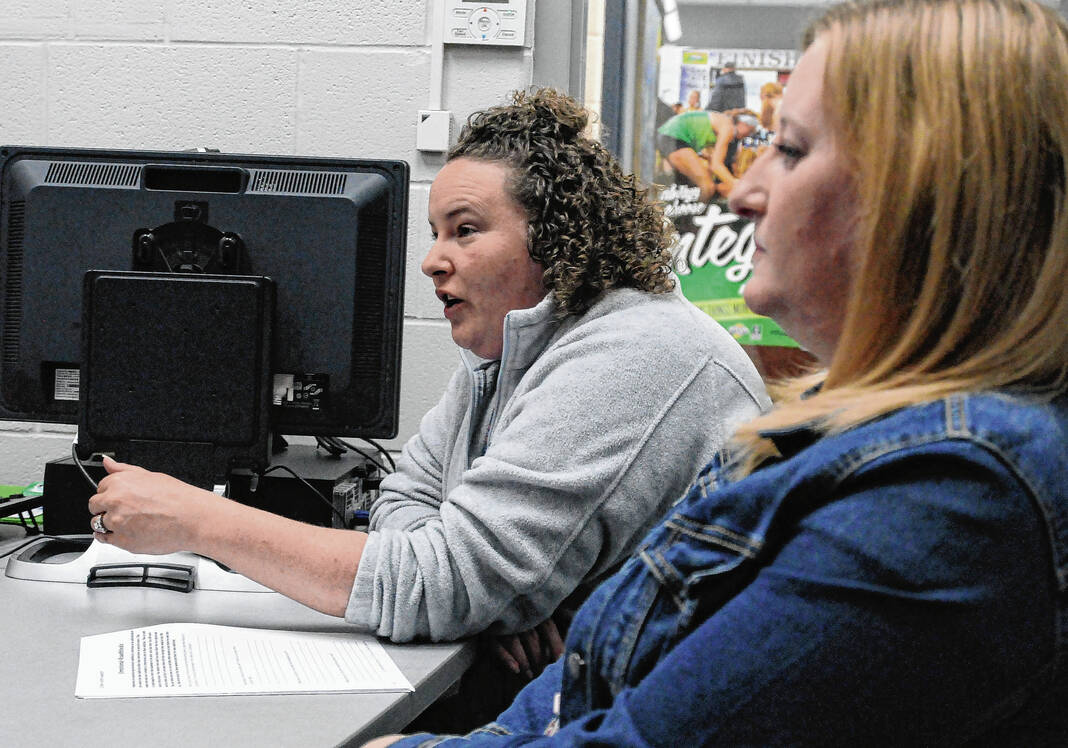
From left, Centerstone employees Michelle Knight, Devon Bolding and Lindsey Poole facilitate a teen addiction and recovery group meeting at Medora High School.
Zach Spicer | The Tribune

Michelle Knight, child adolescent and family services assistant manager for Centerstone and a certified recovery coach, talks to students involved in a teen addiction and recovery group at Medora High School.
Zach Spicer | The Tribune

Devon Bolding, left, a family support specialist for Centerstone and a certified recovery coach, and Lindsey Poole, a therapist for Centerstone, help facilitate a teen addiction and recovery group meeting at Medora High School.
Zach Spicer | The Tribune
While talking to a local school superintendent during a Leadership Jackson County class, a light bulb went off for Michelle Knight.
She realized substance use and mental health are issues for some students, and since she has a passion for helping people overcome addictions, she wanted to start a teen addiction and recovery group in local schools.
Knight, child adolescent and family services assistant manager for Centerstone and a certified recovery coach, decided to start small and since January has been meeting once a week with three students at Medora High School.
Lindsey Poole, a Centerstone therapist who already was working with Medora students, also helps facilitate the small group meetings.
At the start of the 2023-24 school year, the plan is to have Devon Bolding, a family support specialist for Centerstone and a certified recovery coach, start a teen addiction and recovery group at Crothersville High School.
Knight then hopes to establish a group at Brownstown Central High School and then Seymour High School, which is the largest school in Jackson County.
“It’s going really well,” Knight said of the Medora group. “It’s a completely judge-free zone when we bring them in. I hope it’s making a difference.”
Knight said Centerstone had tried to start something similar in the past at one of the agency’s offices, but transportation was an issue for some people. She then asked manager Kristen Shaw about going to the schools, and Medora was the first to jump on board.
To determine students for the group, Knight received referrals from the school’s guidance counselor, Jessica Wischmeier, and then talked to the students’ parents or guardians to get their approval to begin services.
The group is for teens who have an environmental history of addiction and have formed an addiction to vaping, THC or both. THC is the main psychoactive compound in marijuana.
Knight said the first packet the group worked through was the Am I Addicted? Scale, which gives them an idea of how likely they are to be addicted and why they are addicted. That looks at the physical, behavioral, emotional and psychological issues.
“Is it from a physical trauma? Is it a behavioral response?” Knight said. “Then once we tally those up, it gives us an explanation of why we are addicted.”
If they have a THC addiction, Knight said the ultimate goal is to not see them go past that.
“Once you start on the lowest drug, THC, they tend to start experimenting with other drugs, and I don’t want to see that happen,” she said.
The next packet is the Can I Stop? Scale, which focuses on mental, financial, emotional and physical roadblocks.
“We’ve had some students that scored high on the mental roadblocks, and we’ve had some that scored high on emotional roadblocks and physical roadblocks. That just goes back to their trauma,” Knight said.
The group currently has three students who meet for an hour on Wednesdays, and Knight said that’s a good number at the start. Plus, the students and their parents were happy with it being a small group.
“I want it to be a safe space where they can feel comfortable sharing and not feel like they are going to be judged,” Poole said.
“If you use, OK, let’s overcome that, let’s see where we can move forward from that,” Knight said. “My ultimate goal is to decrease the use to eventually no use.”
During the meetings, the Centerstone staff members also talk to students about what they are up to, get to know them and ask them how they are doing. That makes it more comfortable for all involved.
“I think if we just looked at the addiction alone, we would be shorting these guys,” Poole said.
“The unique thing about addiction is it starts at home and what has gone on in their life,” Knight said. “It really helps to meet them at their level and talk to them where they’re at. That’s with any of our clients. We don’t ever want to meet them where they are not ready to meet at.”
Bolding said it’s nice to work with a student who has struggled in life and see them make improvements over time.
Medora High School Principal Kara Hunt said the school was awarded a school counseling grant in January that resulted in students having accessibility to Centerstone staff members, and that helps because administrators and teachers aren’t qualified to provide mental health counseling that students may need.
“We knew that we needed someone in here every school day that would be able to work with those kids that need it, make connections with families, get families where those resources are in our county to help reach out to them,” she said.
Also as part of the grant, school staff members will have access to a mental health counselor from Marian University.
“Whether they do it for (their own) mental health or they may be talking with (the counselor) about how to deal with some of the things that they see that students are having trouble with or that students have to deal with and what is the appropriate way to deal with that, I think it’s going to be really good for the community,” Hunt said.
